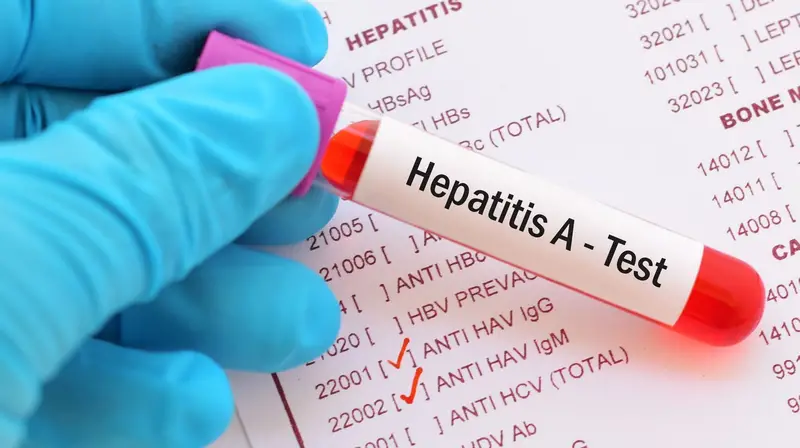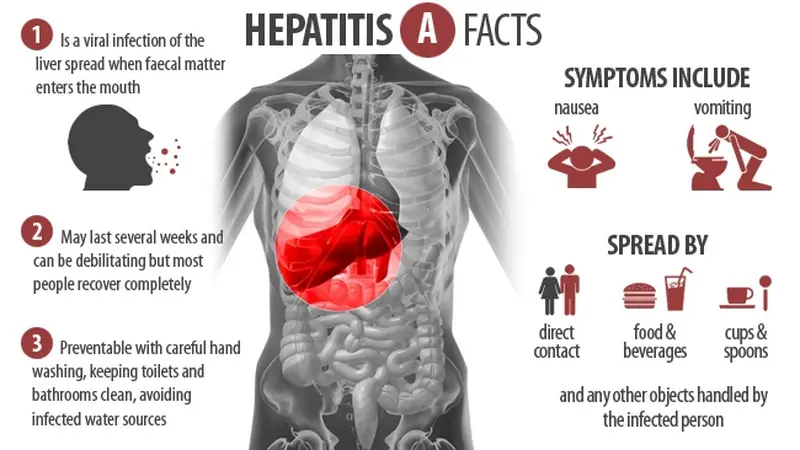Hepatitis-A vaccine
Get In Touch
Call Now
Monday to Friday
9:00 AM To 6:00 PM
Saturday and Sunday
Closed

Hepatitis A Vaccine
- Hepatitis-A Virus
- a form of viral hepatitis transmitted in food, causing fever and jaundice.
- Hepatitis A is very contagious. People can be contagious even before symptoms appear.
- However, the numbers of individuals diagnosed with hepatitis A has been decreasing since the vaccine against HAV was introduced in 1995. and during the first week of illness
- The hepatitis A virus is found mostly in the stools and blood of an infected person about 15 – 45 days before symptoms occur.
- About 3,600 cases of hepatitis A are reported each year. Because not everyone has symptoms with hepatitis A infection, many more people are infected than are diagnosed or reported.
- The vaccine is effective in adults and children.
Jaundiced Patient
- Symptoms & Signs
- The symptoms of hepatitis-A develop, on average, around 4 weeks after becoming infected.
- But not everyone with the infection has symptoms.
- The initial symptoms of hepatitis-A can include feeling tired and generally unwell, joint and muscle pain, a raised temperature, loss of appetite, feeling or being sick, pain in the upper right part of your tummy, a headache, sore throat and cough, constipation or diarrhea, a raised, itchy rash (hives).
- These symptoms usually last from a few days up to a couple of weeks.
- After the initial symptoms, the following symptoms may develop: Yellowing of the Skin and Eyes (Jaundice), Dark Urine,
- Pale Stool, itchy skin, Swelling & Tenderness upper right part of your abdomen
- The doctor will perform a physical examination and may discover that you have an enlarged and tender liver.
- Most people make a full recovery within a couple of months, although the symptoms can come and go for up to 6 months.
- Hepatitis A is not usually serious, but in rare cases it can cause the liver to stop working properly (liver failure).
- Signs of liver failure can include
- Sudden, Severe Vomiting,
- a tendency to Bruise and Bleed easily (frequent Nosebleeds or bleeding gums)
- Irritability, problems with memory and concentration, Drowsiness, Confusion and Coma.
- Get medical advice as soon as possible if you have these symptoms. Liver failure can be life threatening if not treated quickly.
You can get hepatitis A from:
- Eating food prepared by someone with the infection who has not washed their hands properly, or who’s washed them in water contaminated with sewage.
- Hepatitis A virus can be found (fruits, vegetables, shellfish, ice, and water are common sources of the hepatitis A virus).
- Drinking contaminated water, including ice cubes.
- Eating raw or undercooked shellfish from contaminated water.
- Close contact with someone who has hepatitis A, in contact with person who does not wash his or her hands properly after going
- to the bathroom and touches other objects or food.
- Having sex with someone who has the infection, particularly if you touch their anus with your fingers, mouth or tongue
- Injecting drugs using equipment contaminated with the hepatitis A virus.
Hepatitis-A Vaccine
- There are vaccines that work to prevent infection with hepatitis A virus.
- The vaccines contain no live virus and are very safe.
- No serious adverse effects have been reported. Some people have some soreness at the injection site for a few days.
- The vaccines are given in a series of 2 shots. The second is given 6-18 months after the first.
- The shots can be given at the same time as other vaccines.
- Your protection starts about 2-4 weeks after the first shot. The second dose is necessary to ensure long-term protection.
- The vaccines are thought to protect from infection for at least 20 years. The vaccines must be given before exposure to the virus.
- They do not work after exposure.
- Not everyone needs to have the hepatitis A vaccines.
Who should be vaccinated:

- The vaccines are recommended for the following groups:
- People who are likely to be exposed to HAV at work.
- People who work in research laboratories where HAV is stored and handled. Routine vaccination is not recommended for health care workers, food service workers, daycare personnel, and sewage and waste-water workers.
- Individuals visiting developing countries (it must be given at least 4 weeks before the trip). International travel, especially to Asia or South or Central America
- Men who have sex with men.
- People who use illegal drugs – This group has higher-than-average rates of HAV infection. IV drug use.
- People who are likely to become seriously ill if they are infected with HAV – This includes people with impaired immune systems or chronic liver disease.
- People with blood-clotting disorders who receive clotting factors.
- Living in a nursing home or rehabilitation center
- Diagnosis Blood tests may show:
- Raised IgM and IgG antibodies to hepatitis A (IgM is usually positive before IgG)
- Elevated liver enzymes (liver function tests), especially transaminase enzyme levels
Treatment
- There is no specific treatment for hepatitis A.
- Rest is recommended when the symptoms are most severe.
- People with acute hepatitis should avoid alcohol and any substances that are toxic to the liver, including acetaminophen(Tylenol).
- Fatty foods may cause vomiting, because substances from the liver are needed to digest fats.
- Fatty foods are best avoided during the acute phase.
- The virus does not remain in the body after the infection has gone away.
- Over 85% of people with hepatitis A recover within 3 months. Nearly all patients get better within 6 months.
- There is a low risk of death, usually among the elderly and persons with chronic liver disease.
- There are usually no complications. One in a thousand cases becomes fulminant hepatitis, which can be life threatening.
Prevention
The following tips can help reduce your risk of spreading or catching the virus:
- Always wash your hands thoroughly after using the restroom and when you come in contact with an infected person’s blood, stools, or other bodily fluid.
- Avoid unclean food and water.
- The virus may spread more rapidly through day care centers and other places where people are in close contact. Thorough hand washing before and after each diaper change, before serving food, and after using the restroom may help prevent such outbreaks.
Other Tips
- If you have recently been exposed to hepatitis A and have not had hepatitis A before or have not received the hepatitis A vaccine series, ask your doctor or nurse about receiving either immune globulin or the hepatitis A vaccine.
- Common reasons why you may need to receive one or both include:
- You live with someone who has hepatitis A
- You recently had sexual contact with someone who has hepatitis A
- You recently shared illegal drugs, either injected or noninjected, with someone who has hepatitis A
- You have had close personal contact over a period of time with someone who has hepatitis A
- You have eaten in a restaurant where food or food handlers were found to be infected or contaminated with hepatitis A
- Vaccines that protect against hepatitis A infection are available. The vaccine begins to protect 4 weeks after receiving the first dose. The 6- to 12-month booster is required for long-term protection. See: Hepatitis A vaccine
- Travelers should take the following precautions:
- Avoid dairy products.
- Avoid raw or undercooked meat and fish.
- Beware of sliced fruit that may have been washed in contaminated water. Travelers should peel all fresh fruits and vegetables themselves.
- Do not buy food from street vendors.
- Get vaccinated against hepatitis A (and possibly hepatitis B) if traveling to countries where outbreaks of the disease occur.
- Use only carbonated bottled water for brushing teeth and drinking. (Remember that ice cubes can carry infection.)
- If no water is available, boiling water is the best method for eliminating hepatitis A. Bringing the water to a full boil for at least 1 minute generally makes it safe to drink.
- Heated food should be hot to the touch and eaten
Other common hepatitis virus infections include hepatitis B and hepatitis C. Hepatitis A is the least serious and mildest of these diseases. The other hepatitis infections may become chronic illnesses, but hepatitis A does not become chronic.

What Patients Say
Our Testimonials
Why patients trust Dr. Farah with their health

Came in with a headache and started to feel sick. Had a big trip for New Years, therefore I had to solve my problems quickly. Dr. Farah helped me right away and treated all my problems, he saved my weekend. Will come here again soon.
Melanie Warner

I was in a lot of pain and I walked in and the receptionist was so lovely. I was into see the doctor within five minutes and he listened to me and was wonderful. I’ve been to a few urgent cares and this one by far is the best !
Tiffany Lee-Frank

I absolutely love Dr Farah and his whole staff on the medical and the spa side. I’m not just saying this, Dr Farah has been my doctor over 10 years and I’ve been using his Rejuvenate spa for about 4 years now. I would give them 10 stars if I could!!!
Lori Brooks

Ashley and Anna are friendly and made me feel welcome and at ease. Dr. Farah was very understanding and answered all my stupid questions. They were all very professional and patient with me.
juli ross
Providing Urgent Care for non-life-threatening health complications

Urgent care services
Monday to Friday
9:00 AM To 6:00 PM
Saturday and Sunday
Closed
17130 Ventura Boulevard,
Encino California 91316






